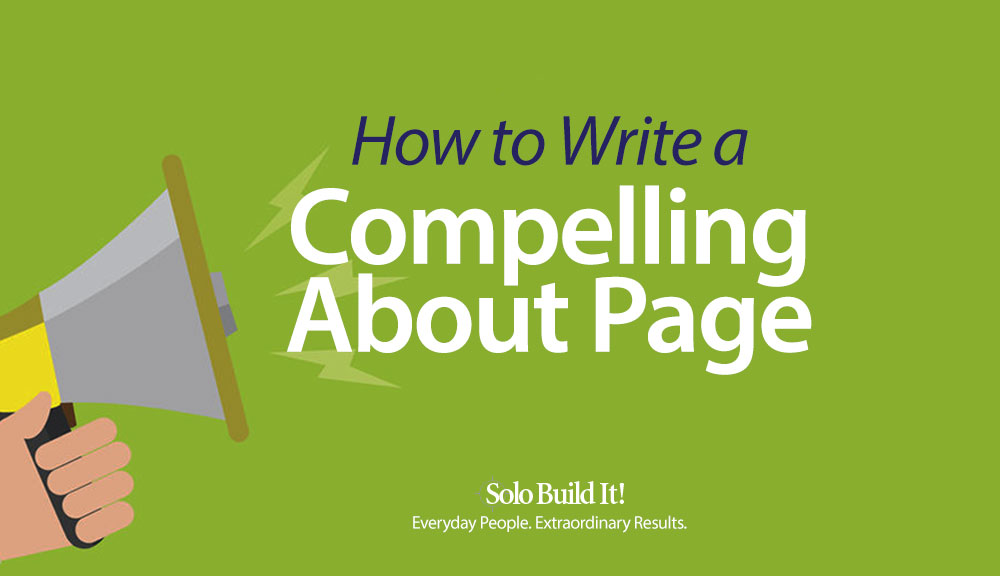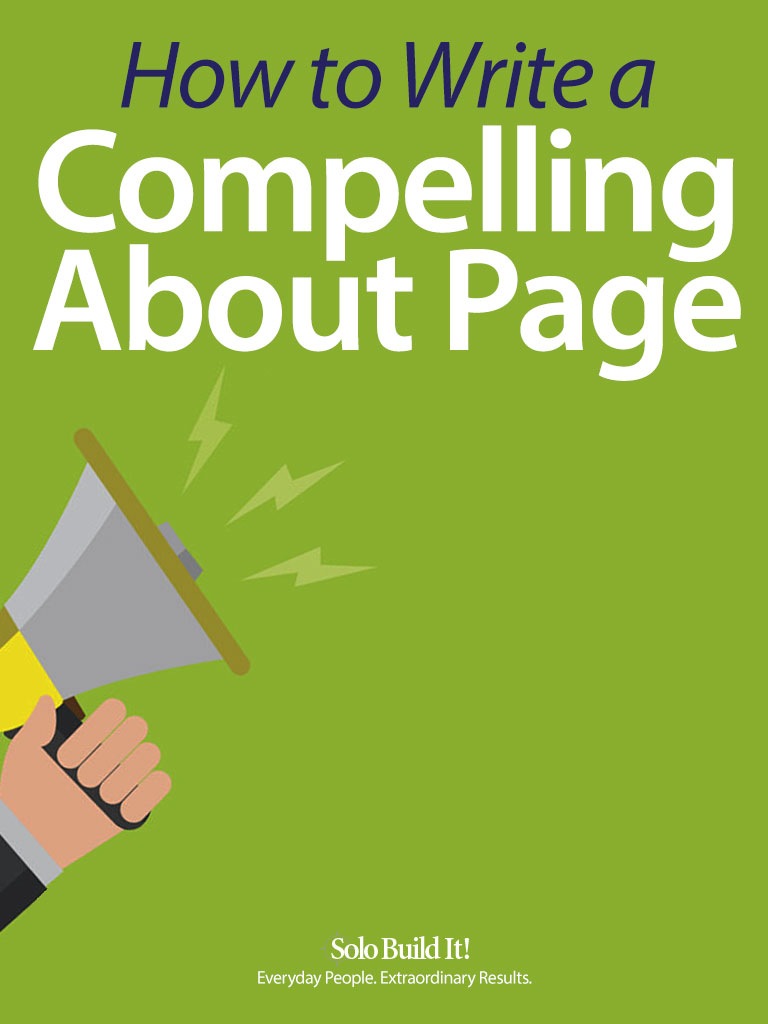
Introduction: New Year, New About You
When was the last time you read your “About” page? Do you even have one? Did you know that the About page is one of the most critical on your website or blog?
For most bloggers and online business owners, the About page is something to write about and instantly forget.
It should, however, be one of the most carefully crafted and consistently updated pages on your website.
Here’s why, and the steps to take to make yours stand head and shoulders above your competitors.
Step 1: Understand the Most Critical Point About the “About” Page
Here’s the thing.
Wait. Say that again?
Yep. You may think you’ve misread that, or that it’s the leftover eggnog in your post-Christmas system. So let me repeat it.
Your About page should not be all about you.
 Let’s consider why. Think back to a time when you first met someone you found so boring that you looked for ways to escape. At a party maybe (New Year may still be uppermost in your mind). Or that section manager you sat next to at work dinner.
Let’s consider why. Think back to a time when you first met someone you found so boring that you looked for ways to escape. At a party maybe (New Year may still be uppermost in your mind). Or that section manager you sat next to at work dinner.
Now think about meeting someone you found fascinating.
What was the difference?
Chances are the person who bored the pants off you talked incessantly about himself. His interests. Family. House. The new carpet he had fitted before New Year. Maybe he even dug out a few photos of the last family holiday in Florida.
Within five minutes your eyes were glazing over. Two minutes later, you had to shake yourself to stop falling asleep.
Me, me, me. It’s boring. Self-serving.
And that fascinating person? He likely found out more about you than you did about him. He answered questions about himself if you asked, but seemed more interested in you. Your life. Your issues.
It’s a fact of the human psyche — people like to talk about themselves. The way to make yourself popular at any party is to ask people you meet questions about themselves — not to tell them every last detail about you and yours.
It’s no different on your About page.
Because your About page is for your site visitor. It’s not about you.
Think about that for a few minutes while I grab a coffee…
Step 2: Know What Your About Page Goal Is
Think about (or take a look at) some About pages in your own niche. Chances are they go something like this:
Hi! My name’s Fred Bloggs and I live in Miami, Florida. I have a wife and 3 kids and I love going to Walt Disney World.
The reaction from Fred’s site visitor? “Who cares?” — and she clicks away.
Fred might have a wealth of information for the first time visitor to Disney, and you might be looking for exactly that. But he didn’t say so.
Most bloggers don’t take time on the About page to talk to site visitors about how they (the site visitor) will benefit. If you do, you’ll stand out from others in your niche.
Remember: you’re talking to people who have come to your blog or website because they want to know something about or for themselves. Their own problems in their own life. Their own challenges. Their own needs and wants.
 Only after you’ve acknowledged what their issues might be do they want to know how you’re going to help them.
Only after you’ve acknowledged what their issues might be do they want to know how you’re going to help them.
If it’s all about you, your reader, like Fred’s, may well click away. They don’t have the time to hear your fascinating (to you) story about your children’s many, many achievements.
They need to know, straight away, that you’re the right person to deal with their concerns. That the products you highlight will be genuinely useful. That reading your website or blog will be the best fit for them.
So, before you put fingers to keyboard, think about their issues. What motivates visitors to read the About page of an informational online business?
There are likely two reasons:
-
They’re looking for advice about a particular problem that requires some form of action. They need to know that the person they’re taking advice from has the credentials and/or the experience to offer good, solid information.
-
They’re on the point of buying a product recommended on the site and want to check out whether the person recommending it seems to be honest.
So there are two goals for your About page. Reassure your site visitor, and engage her. Tell her you understand the issues. Explain why you can help. Show her what you’ve done for others in her position. Establish your credentials.
Step 3: Stop Trying to Be Perfect
Accept it: there’s no one perfect way to write an About page. What really matters is the message, the motive behind the information, and the value it will bring to your target audience.
About pages often look (and sound) like an afterthought.
 Your aim is to position yourself as the go-to expert. Someone your readers both like and trust. If you get it right, it can help build your position and your brand.
Your aim is to position yourself as the go-to expert. Someone your readers both like and trust. If you get it right, it can help build your position and your brand.
And if you get it wrong? Re-do it! But don’t let getting it wrong prevent you from publishing it in the first place. Strive for continuous improvement, not perfection.
In any event, your “About” story is likely to change over time. So as soon as you’ve written it, schedule time in your diary to review it at least every 3 months, or as your circumstances change (e.g., you won an award in your niche, or you earned another credential).
Step 4: What Not to Do
First step, don’t be boring. Second step, know your goal. Third step, don’t try to be perfect.
Fourth step…
-
Don’t sell your product on the About page. This is not a sales page — except in the sense that it’s selling you. Using a hard sell anywhere is likely to drive customers away from your page. On the About page it’s a definite no-no.
-
Avoid jargon. You’re talking to people, and although your aim is to be read as an authority, you’re “advertising” yourself as a person. Talk as you would normally talk. Write your About page in the same “voice” you use elsewhere on your site.
How about “professional” sites? A lawyer, for example, will not use the same voice as a breeder of exotic snakes. The important point here is to keep it professional but use everyday language. The words you use on a website are not likely to be the words you would use drafting a petition to the courts.
 Don’t use gimmicks. Animated GIFs, for example, may be a growing trend, but to many people they’re just irritating distractions from the text. Your goal on this page is to keep your readers focused on what you can do for them. Don’t distract them from that.
Don’t use gimmicks. Animated GIFs, for example, may be a growing trend, but to many people they’re just irritating distractions from the text. Your goal on this page is to keep your readers focused on what you can do for them. Don’t distract them from that.
Step 5: Plan, Plan, Plan
Would you write an article for your website or blog without planning it? Or would you carefully think through each piece of information you want to cover?
The About page is no exception. Before you begin, consider what you want to cover. That might include answers to any or all of the following:
-
Why does s/he come to your website / blog? What is her main problem? The questions she needs answers to? The things that keep her awake at night? (For SBIers, this is covered in detail in DAY 4 of the Action Guide.)
-
What do you aim to do for this reader? Explain what you can offer her.
-
Why is your information different from that on all the other websites or blogs in your niche? What makes you and your content stand out from the rest?
-
Where did your passion for your niche begin? What is your story? Good stories make you more human. They provide context and meaning for your knowledge. Using your story means your audience is more likely to connect with you — maybe even share it with others.
If you have a great story about how your product or service came about, share it.
-
What are your values and principles? Why would that matter to your website visitor?
-
Where has your knowledge about your niche come from? Do you have qualifications? Have you read extensively? Be very specific here. “I’ve read lots of books about exotic chickens” doesn’t cut it. Remember: establish your authority.
-
Do you have examples of other people who have benefited from your expertise? Give examples and again, be specific. Add a testimonial or two.
Step 6: Start Writing!
Using your plan to guide you, just start writing. Don’t overthink it. Remember, your About page focuses on your site visitor but tells your story. It makes connections between that story and how it can help her.
Use these points as guidance…
-
Don’t just use “About” as your file name. Add your name to it (e.g., about-cath-andrews.html).
-
Immediately highlight the benefit for your reader by starting with a benefit-driven headline.
 What’s the key benefit of your page? “All About Me” does not give the reader any indication of why she should care. “About Cath: The Crazy Chicken Lady and Why She Can Help Solve Your Flock-Related Problems!” has more impact.
What’s the key benefit of your page? “All About Me” does not give the reader any indication of why she should care. “About Cath: The Crazy Chicken Lady and Why She Can Help Solve Your Flock-Related Problems!” has more impact.
Remember: your reader only cares about you in relation to what you can offer her.
-
Use subheadings to explain each benefit she’ll receive from your knowledge and your expertise.
-
The average attention span for a human being is now around 8 seconds. (The attention span of a goldfish is 9 seconds1.) So you don’t have much time. Put all your most important information above the fold, where 80% of your reader’s time will be spent2.
-
Storytelling is a powerful medium — it’s been proven to raise engagement and therefore conversion rates3. So tell your story, but make sure it stays focused on how that story helps your site visitor.
-
Think about how you use words, and use emotive language that connects with your reader — it’s more persuasive. “I’m passionate about…”; “I’m here to help you”; “I know what that feels like!”
-
Use testimonials to increase trust in you, your content and, by implication, any products you sell. Do you have emails or comments on your articles from others who have found your information valuable? Use them! And be sure to use their full name and the city and country they live in. A photo of them is a definite plus.
But never, never use fake testimonials. There’s enough fake information around the internet these days without you adding to it. It will destroy trust in you and your brand in a millisecond.
-
Make sure it’s clear and free from errors.
Step 7: Will Images Help?
Yes, they will.
When people click over to this page, they’re looking for more information about you. Of course, establishing your authority is the prime concern.
 But including a simple photo or two of you adds to the personalization you’re also aiming for. You’re establishing yourself as an individual rather than a large, faceless company. Someone your visitors could see themselves sitting across a table from, sharing information about your niche.
But including a simple photo or two of you adds to the personalization you’re also aiming for. You’re establishing yourself as an individual rather than a large, faceless company. Someone your visitors could see themselves sitting across a table from, sharing information about your niche.
It’s a glimpse into your world. An injection of some personality. It may be a professionally taken profile (a head shot) if your niche is, for example, a “professional” one such as a counsellor. It could be a family photo if your niche covers family vacations.
Even better is a photo or a short video of you doing whatever your site is about. Have a travel site about Rome? Think about a photo of you in front of an easily recognized landmark — the Colosseum, perhaps.
Is yours a quilting niche? Take a photo of you with your latest creation. Don’t want to appear in person in a video? What about an “over-the-shoulder” video of you stitching as a voice-over tells the story of how you developed your skill.
Use different media to break up text, lead the eye down the page, and help tell your story.
Do you have a team working with you? Personalize them. Think about taking a photo of each person at their job — site visitors love “behind-the-scenes” stories where they feel in possession of privileged information.
The important goal with images and videos?
Use them to help verify claims. “I say I know what I’m doing when I tell you how to help a chick to hatch. Here’s a video of me doing exactly that.”
Step 8: A Call to Action
A Call to Action on an “About” page? Why not?
Where do you want people to go after they’ve read your About page? What you don’t want is for them to click away from your site. So this is as important for your About page as for any other content article you write.
 At the end of your About page, your visitor is engaged. Even excited to be “working” with you. She knows a bit more about you, and knows you can relate to her needs.
At the end of your About page, your visitor is engaged. Even excited to be “working” with you. She knows a bit more about you, and knows you can relate to her needs.
It’s the ideal time to build your list. So why not think about asking for an email address?
Not sure whether this would work? AWeber gives an example of a study by a company that added an opt-in form to their About page — and increased their subscribers by 158% in one month, 99% in a six month period4.
Of course, you need to make sure the reader is clear about the benefit to her of giving up her email address — don’t just stick a form on the page and expect it to work miracles.
Something as simple as:
“If you have a passion for [whatever your niche is], you’re in the right place. And if you don’t want to miss a thing, why not sign up for free monthly [or however frequently they are] updates in my newsletter?”
The call to action is an indispensable element of your About page. Whether you choose an opt-in form, a link to your best blog posts or something else, make sure there is one, and above all, make sure it provides value to your readers.
So — Start the New Year on a High By Rockin’ Your About Page!
The importance of the About page is greatly underestimated by many online business owners. It’s second in importance only to the home page.
And it can rock your site, because it’s essentially a human interest story.
But that interest must lead back to your visitor. It’s human nature. When any of us is looking for advice, information or products, we want to know what a brand can do for us.
So, use your About page well. Use your own personal story and unique selling point to show value, usefulness and enthusiasm. Create a strong impact that makes your site visitor want to keep coming back for more.
Be yourself, but focus on why your reader should care. The rest will follow.
Some of the information mentioned here comes from an e-book written by Ken Evoy, founder and CEO of SiteSell. The book is a response to Google’s August 2018 “Medic” algorithm.
Using information derived from analyzing a large pool of data available about SBI! websites, Ken gave SBI! members action steps to help sites recover from Medic and vaccinate them against future algorithm changes.
That book is a private resource for SBIers.

Cath Andrews
Latest posts by Cath Andrews (see all)
- Start a Passion-Based Business and Live Your Dream - February 1, 2023
- What Do You Say When Their Eyes Glaze Over? - December 20, 2021
- How to Monetize Your Email List in 5 Simple Steps - October 26, 2021


